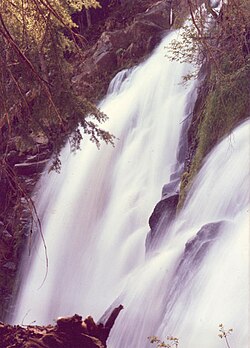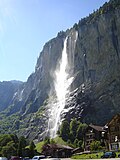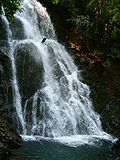AY Honors/Waterfalls/Answer Key
A waterfall is usually a geological formation resulting from water, often in the form of a stream, flowing over an erosion-resistant rock formation that forms a sudden break in elevation. Waterfalls may also be artificial, and they are sometimes created as garden and landscape ornament.
Some waterfalls form in mountain environments where erosion is rapid and stream courses may be subject to sudden and catastrophic change. In such cases, the waterfall may not be the end product of many years of water action over a region, but rather the result of relatively sudden geological processes such as thrust faults or volcanic action.
The hobby of falls bagging is blossoming in many parts of the world.
Formation
Typically, a stream flow across an area of formations strata will form shelves across the streamway, elevated above the further stream bed when the less erosion-resistant rock around it disappears. Over a period of years, the edges of this shelf will gradually break away and the waterfall will steadily move upstream. Often, the rock strata just below the more resistant shelf will be of a softer type, and will erode out to form a shallow cave-like formation known as a rock shelter (also known as a rock house) under and behind the waterfall.
Waterfalls can also form due to glaciation, whereby a stream or river flowing into a glacier continues to flow into a valley after the glacier has receded or melted. The large waterfalls in Yosemite Valley are examples of this phenomenon.
Streams often become wider and more shallow just above waterfalls due to flowing over the rock shelf, and there is usually a deep pool just below the waterfall due to the kinetic energy of the water hitting the bottom.
Types of waterfalls
- Block
- Water descends from a relatively wide stream or river.
- Cascade
- Water descends a series of rock steps.
- Cataract
- A large waterfall. See Cataracts of the Nile for a well-known sequence of six.
- Fan
- Water spreads horizontally as it descends while remaining in contact with bedrock.
- Horsetail
- Descending water maintains some contact with bedrock.
- Plunge
- Water descends vertically, losing contact with the bedrock surface.
- Punchbowl
- Water descends in a constricted form, then spreads out in a wider pool.
- Segmented
- Distinctly separate flows of water form as it descends.
- Tiered
- Water drops in a series of distinct steps or falls.
- Multi step
- A series of waterfalls one after another of roughly the same size each with its own sunken plunge pool.
i dont know cos im dum
Gallery
- Base of Tower Fall with rainbow-750px.JPG
Tower Fall in Yellowstone National Park, USA
Iguazu Falls, between Brazil and Argentina
Wailua Falls in Hawaii, USA
Staubbach Falls flows into the town of Lauterbrunnen, Switzerland
Dettifoss in Iceland
Man-made waterfall at the Australian National Botanic Gardens in Canberra, Australia
Waterfall near Brienzersee, Switzerland
Earthen Dam Waterfall in Waverly, New York, USA
- Kaieteur.jpg
Niagara Falls, on the border between Canada and the USA
A small part of the Krimml Falls, Austria. Scale is given by the people on the right
Burney Falls, located near Burney, California, USA
Victoria Falls in Africa.
External links
- Waterfalls WebRing
- World Waterfall Database
- WorldWaterfalls.com - Stock Waterfall Photos, Waterfall Information, Waterfall Forum
- Niagara Falls - Fullscreen QTVR Panorama
- Waterfalls of Victoria (Australia)
- Waterfalls of Tasmania, (Australia)
- Waterfalls of the world, links
- WaterfallTalk Mailing List
ru:Водопад ca:Cascada cs:Vodopád da:Vandfald de:Wasserfall et:Juga es:Cascada eo:Akvofalo eu:Ur-jauzi fr:Chute d'eau gu:ધોધ id:Air terjun it:Cascata he:מפל מים la:Cataracta nl:Waterval ja:滝 no:Foss nn:Foss pl:Wodospad pt:Cachoeira simple:Waterfall sl:Slap su:Curug fi:Vesiputous sv:Vattenfall vi:Thác nước tr:Şelâle uk:Водоспад zh:瀑布
















